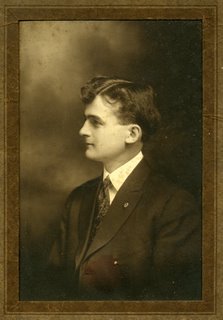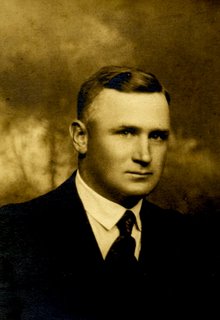The Perspective from Then
 So young. So ready. I've been looking at the eyes of yesterday's children for the past few days. The lad to the left is Russell. He has the look of a scholar, doesn't he? Some people just wear that look very well. Russell grew up in a rural community in southern Indiana. He went on to serve briefly in the Army, attend Indiana State Teachers College (now known as Indiana State University, alma mater of Larry Bird, your author adds with a healthy dollop of Hoosier Pride), then taught in the Daviess County school system. He was a farmer, a lover of history, a Bible scholar and teacher, and at one point a legislator in the Indiana House of Representatives. He collected nearly every Zane Grey book written. They are in our spare room. So he had a steady reading diet of chivalry, nobility, tenacity, morality, and idealism. Having read the same books growing up, I can vouch for such a literary regimen. It won't guarantee you success, but you may turn out to be a darn sight nicer to be around than some folks.
So young. So ready. I've been looking at the eyes of yesterday's children for the past few days. The lad to the left is Russell. He has the look of a scholar, doesn't he? Some people just wear that look very well. Russell grew up in a rural community in southern Indiana. He went on to serve briefly in the Army, attend Indiana State Teachers College (now known as Indiana State University, alma mater of Larry Bird, your author adds with a healthy dollop of Hoosier Pride), then taught in the Daviess County school system. He was a farmer, a lover of history, a Bible scholar and teacher, and at one point a legislator in the Indiana House of Representatives. He collected nearly every Zane Grey book written. They are in our spare room. So he had a steady reading diet of chivalry, nobility, tenacity, morality, and idealism. Having read the same books growing up, I can vouch for such a literary regimen. It won't guarantee you success, but you may turn out to be a darn sight nicer to be around than some folks.Russell had a couple of brothers. Tell Eli was one.
 He is most likely the fleet-footed fellow written about in a previous post. The first of the brothers to leave for college, he went to the University of Illinois in Champaign, then to Central Normal, in Danville, Indiana. He came back to Daviess county and taught school for a while and farmed. The property on which he and his wife lived had been used as a station on the Underground Railroad. That really has nothing to do with anything beyond the cool factor.
He is most likely the fleet-footed fellow written about in a previous post. The first of the brothers to leave for college, he went to the University of Illinois in Champaign, then to Central Normal, in Danville, Indiana. He came back to Daviess county and taught school for a while and farmed. The property on which he and his wife lived had been used as a station on the Underground Railroad. That really has nothing to do with anything beyond the cool factor.  Russell's other brother is on the left. This one is Harold Leland. In his youth he was known as "Dude." In the beginning years of the 1900s that was how they pronounced Mac Daddy. He studied at University of Illinois. I don't know if he studied genetics then, but he went on to launch a hybrid seed corn business in 1917 that bears our family name to this day. Harold became a successful entrepreneur, Indiana's Corn King in 1930--an award earned as well in 1943 by his firstborn son. He also became my grandfather. Unfortunately, he passed away before my father graduated from high school, so I've met him only in the stories from my father. He was described as "of a quiet disposition, and sincere nature and was highly respected by all who knew him."
Russell's other brother is on the left. This one is Harold Leland. In his youth he was known as "Dude." In the beginning years of the 1900s that was how they pronounced Mac Daddy. He studied at University of Illinois. I don't know if he studied genetics then, but he went on to launch a hybrid seed corn business in 1917 that bears our family name to this day. Harold became a successful entrepreneur, Indiana's Corn King in 1930--an award earned as well in 1943 by his firstborn son. He also became my grandfather. Unfortunately, he passed away before my father graduated from high school, so I've met him only in the stories from my father. He was described as "of a quiet disposition, and sincere nature and was highly respected by all who knew him."I spoke with my father this evening about these pictures and about the people in them and the times in which they lived. For many years Harold and Tell farmed with horses or mules. They farmed through the Depression years. Slowly they improved their lands and their farming operations. The first seed house for the hybrid corn operation was on the homeplace where my father, my sisters and I spent our first few years. Later, Harold's first grand-child, jane, moved there with her family. Her kids are the fifth generation of the family to live there.
It is interesting to consider what draws people to a place. I'm surprised by the will of people to either start something from scratch, knowing it will never reach its potential in their lifetime, or to receive it gratefully and continue to develop it to pass to the next generation. This is particularly meaningful in light of a lifestyle and standard of living such as we have today, when so many things are either not valued or de-valued and are considered disposable long before all their usefulness is consumed. How far we stray from the mold from which our forebears were formed.
